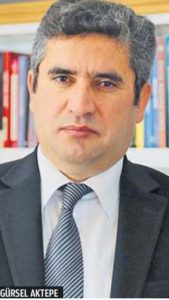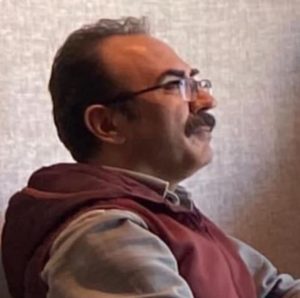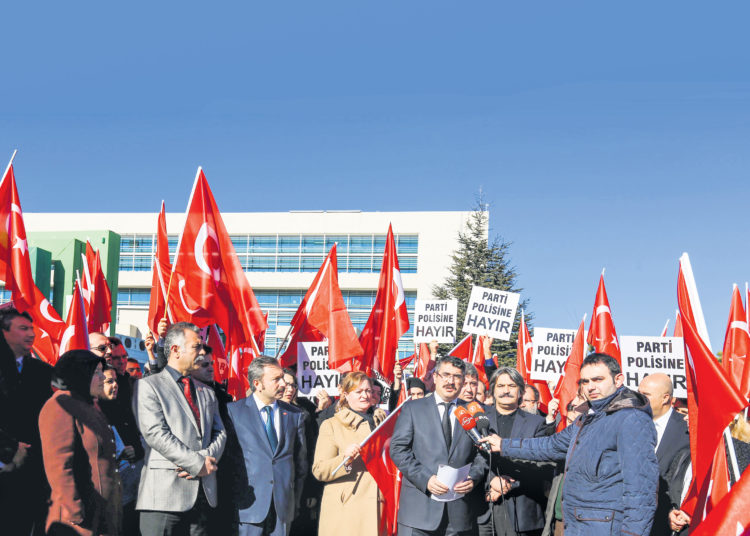Abdullah Bozkurt/Stockholm
A senior police intelligence chief who had campaigned on behalf of a police association against turning Turkey’s main law enforcement agency into a political tool in the hands of the authoritarian government of President Recep Tayyip Erdoğan was brutally tortured and then jailed.
According to court documents obtained by Nordic Monitor, Gürsel Aktepe, deputy chief of the intelligence unit at the Security General Directorate (Emniyet), was subjected to days of torture and abuse and forced to sign a false statement incriminating himself on bogus charges.
In a hearing held at the Ankara 14th High Criminal Court on May 3, 2018 after 22 months in pre-trial detention, Aktepe for the first time had a chance to reveal the graphic details of his torture by teams that were ordered to force him to sign a prepared statement to support the government storyline concerning a coup attempt on July 15, 2016.
He was detained the next day on his way home to check on his family. He was handcuffed, blindfolded and taken to the police intelligence office in Ankara.
“The torture, which began with insults and beatings, later became more systematic, such as exposing my naked body to cold water as well as sexual harassment. I remember being hit many times on the head with a piece of wood. The contraction of my body, caused by not knowing when and where they would hit next, was another form of torture. I lost consciousness after they hit me many times,” he said
Gürsel Aktepe revealed details of the brutal torture he was subjected to at the hands of police officers:
When Aktepe woke up, a new team of torturers was standing in the room. They put a plastic bag over his head and dragged him to a corner of a room in the basement. “I was forced to my knees with my hands cuffed behind my back. Meanwhile, a person stepped hard on the handcuffs, causing the metal clamps to sink into my wrists and inflict deep wounds,” he recalled.
“Someone else put a gun to my head and kept threatening to kill me. He pulled the trigger on his empty gun to my head. They repeatedly asked me to accept what they said,” he added. The abusers wanted him to say that he had been on his way to take over the intelligence department on the night of the coup, which was false.

The torture went on for six days, during which time he was denied food, water and sleep. His abusers said his family would be brought in to be tortured as well. “The torture had become so unbearable for me that I couldn’t take it anymore, so I thought if you really thought I had anything to do with the coup or any lawlessness, you could put a bullet in my head,” he said.
At one point, his abusers drugged him, causing him to hallucinate and hear strange noises. He said lost his free will and had difficulty making sense of what was happening. He told the judges that he would recant all statements that were imposed on him under terrible conditions. “None of the names, events and incidents mentioned in my initial statements are true. I ask the court to consider my testimony here as the real truth of the matter,” Aktepe underlined.
The public prosecutor wrote a statement as if Gürsel Aktepe, who could not even remember his name after the torture, had given his statement of his own free will:
Aktepe, a veteran intelligence officer with 24 years of experience in cracking down on terrorist and criminal networks in Turkey, was in the crosshairs of the Erdoğan government when he blew the whistle on a secret plan to turn the police force into a group of partisan hacks for the ruling Justice and Development Party (AKP) in 2014. He ran advocacy campaigns on behalf of the Association of Defenders of Police Officers’ Rights.
He came out publicly to criticize the government’s mass dismissals from the police force, including many veteran chiefs, and had spoken to the media and tried to raise awareness about the government’s ill-advised policies after he was dismissed from the force in September 2014.
The police chiefs were viciously targeted by the Erdoğan government in the aftermath of December 2013 corruption investigations that incriminated President Erdoğan, his family members and his inner circle in graft schemes that involved money laundering activities on behalf of the sanctioned Iranian regime.
The Erdoğan government hastily removed prosecutors and police chiefs who were involved in not only the corruption probes but also in terrorism cases involving Iran’s Quds Force, al-Qaeda and the Islamic State in Iraq and Syria (ISIS).
Although he had a long and spotless career, Aktepe was unlawfully and abruptly dismissed from the force, faced malicious prosecution and accused of crimes he had nothing to do with. He was detained while on his way home to check on his family on the tumultuous night of false flag coup attempt on July 15, 2016. Some 30,000 police officers including many senior chiefs have been purged and/or jailed in Turkey in the last six years alone.
Aktepe filed multiple criminal complaints against his torturers and named officers Engin Dinç, the then-head of the intelligence unit; his deputies Erdal Çetinkaya, now the head of the cybercrime department; Yılmaz Delen, now the head of Tunceli provincial police department; and Kenan Daşkın, retired, as responsible for the torture.

But Turkish authorities ignored his petitions and protected his abusers, who had violated Turkish penal code articles that ban torture and ill-treatment. “I lost all hope of ever getting out of jail,” he told the panel of judges.
Torturers in Turkey were protected by a government decree issued by President Erdoğan that provided blanket immunity for officials who were involved in coup investigations. Decree-law No. 667, issued by the government on July 23, 2016, granted sweeping protection for law enforcement officers in order to prevent victims from pressing complaints of torture, ill treatment or abuse against officials. There were multiple cases in which Turkish prosecutors refused to investigate torture allegations, citing this decree-law, or KHK (Kanun Hükmünde Kararname).
Article 9 of this KHK stated that “legal, administrative, financial and criminal liabilities shall not arise in respect of the persons who have adopted decisions and fulfill their duties within the scope of this decree-law.” The decree was criticized by human rights organizations for being a clear violation of articles of the International Covenant on Civil and Political Rights (ICCPR) as well as the European Convention on Human Rights, to which Turkey is a party, yet it was never annulled. In fact, the Turkish parliament passed the decree into law on October 18, 2016.
As of today, no prosecution has been initiated against people who tortured detainees at unofficial sites despite multiple complaints filed by the victims and their lawyers.
The torture left permanent marks on his body and soul. He lost some of his teeth, and others were damaged from the beatings. He has difficulty speaking because of the damage to his jaw and mouth. The trauma he suffered from hits to the head caused him to forget things, have difficulty concentrating and draw blanks when trying to remember events.
The full testimony of Gürsel Aktepe:
He also received psychological counseling while in prison when his cellmate, Burak Açıkal, a computer engineer, died by suicide as a result of his traumatic experience of torture. “That left a very deep scar on my spirit,” Aktepe said.
“I still have bouts of depression when I think back on those days,” he noted.
After the torture in the police intelligence office, Aktepe was taken to prosecutor Alpaslan Karabay on July 20, 2016. He said could barely stand and could not even remember his name due to the strikes to his head; yet Karabay listed a number of names and incidents in his statement as if he actually had actually given a statement. That falsified statement written by the prosecutor Karabay was included in the indictment as evidence against him. Karabay has a notorious record when it comes to taking depositions from defendants in his office. In a previous report, Nordic Monitor identified this prosecutor as a man who had asked another defendant to lie and threatened him with harm to his wife and children.

In addition to coup charges, the prosecutor also leveled accusations of illegal wiretapping against him. He said in his defense that all wiretaps were authorized by judges. He also added that the parliamentary investigation committee, Interior Ministry inspectors and the State Inspection Board (Devlet Denetleme Kurulu) all ran separate investigations into claims of illegal wiretapping when he was deputy intelligence director. They reviewed the records of the intelligence department, looked into the wiretaps and cleared police intelligence of any wrongdoing.
Despite the lack of evidence, Aktepe was convicted at the end of a sham trial and sentenced to 15 years in prison on coup plotting charges, in December 2020. A separate trial on other dubious charges against him is still pending. He was expected to receive additional jail time on charges of affiliation with the Gülen movement, a vocal dissident group that is opposed to the policies of the Erdoğan government on a number of issues such as pervasive corruption in the administration and Turkey’s aiding and abetting of armed jihadist groups.












